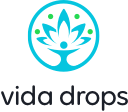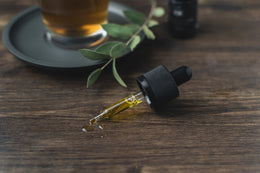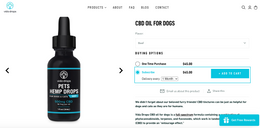What is the Difference Between CBD Isolate and Full Spectrum CBD?
What is the Difference Between CBD Isolate and Full Spectrum CBD?
There’s no question that CBD is one of the most important natural remedies available today; but, as with any celebrated product, with increasing popularity comes exponential confusion.
All CBD is the same, right?
Wait, what’s CBD isolate?
Is there a type of CBD that doesn’t contain THC?
Are full spectrum and broad spectrum CBD the same?
What does “spectrum” mean, anyway?
Does it even matter?
And everyone’s got an opinion.
We’re here to cut through the bologna and give you the facts, all the facts, and nothing but the facts. What you do with them--that’s up to you!
CBD Isolate vs. Full Spectrum CBD
CBD isolate is an ultra-purified extraction of CBD from the hemp plant. In this context, “ultra-purified” means that CBD isolate undergoes extra processing to remove some of the phytochemicals normally found in cannabis. Conversely, in full spectrum CBD, you’ll get everything the plant has to offer--multiple cannabinoids (including the federally legal amount of THC), terpenes, and other compounds.
Full Spectrum CBD vs. Broad Spectrum CBD
You might be able to deduce the difference between these cousins from their names alone. As described above, full spectrum is for those who want all possible cannabinoids, including THC. According to federal law, all CBD products must be hemp-based, which means they will carry less than 0.3% THC--certainly not enough to have any psychoactive effects.
However, if cannabis is illegal in your state, or if you want to avoid THC altogether, broad spectrum may be the way to go. Broad spectrum contains a broad range of cannabinoids (as opposed to only CBD, as is the case with CBD isolate), but no THC (below .3%).
There is a lot of advocacy for full spectrum CBD over broad spectrum due to the entourage effect. If you’re curious, click here to read more about how CBD and the entourage effect works on the human body.
At the end of the day, you’ll decide what’s right for you! What matters most is the quality, purity, and reliability of the products you choose to purchase.
What Do Terpenes Do?
Terpenes perform a variety of functions that enhance and synergize with CBD. These chemicals aren’t unique to cannabis--many are present in other plants as well. Some examples of terpenes commonly found in cannabis include:
-
Myrcene – This is the most abundant terpene in cannabis. Myrcene acts as an anti-inflammatory and a relaxant. It is also found in mangoes, at concentrations of up to 1.29 mg per kg of fruit.
-
Limonene – Also found in citrus rinds and juniper berries, Limonene has been known to relieve anxiety, depression, and inflammation. It also enhances the pain relieving effects of CBD. This is the second most common terpene usually found in full spectrum CBD.
-
Caryophyllene – This terpene is unique in its ability to bind with CB2 receptors in our endocannabinoid system and has been found to have anti-anxiety and pain-relieving properties. Caryophyllene has also been associated with a significant decline in alcohol consumption by heavy drinkers and has been used successfully in alcohol rehabilitation.
-
Pinene – Pinene is the most common terpene in the plant kingdom. It’s copious in pine trees, but rosemary, parsley, and basil are also good sources. Pinene has anti-inflammatory properties, helps improve airflow and breathing, and can provide relief for individuals with Crohn’s disease and arthritis.
- Terpinolene – Research on Terpinolene has revealed antibacterial and antifungal properties. The strong, herbaceous scent of nutmeg, cumin, and lilac can be attributed to this terpene. Terpinolene-dominant CBD strains of cannabis are rare and valued for their fresh smell and taste.
This is just a small sample. Depending on the strain, hemp might contain any combination of up to 200 different terpenes!
Terpenes in and of themselves can be highly beneficial homeopathic remedies. Consequently, when you consume a full spectrum CBD product, you and your endocannabinoid system are served not just by the CBD, but also by all the phytochemicals and terpenes that are nestled in that specific strain of hemp.
Should I Choose CBD Isolate, Full Spectrum CBD, or Broad Spectrum CBD?
Why would someone choose an isolate when full spectrum CBD, in all its phytochemical opulence, is available? There are a few reasons:
-
For government employees, or others whose employers conduct regular drug testing, a THC-free CBD product may be the best bet--not because it’s likely that a legal CBD product would result in a positive THC reading, but simply because the peace of mind might be worth it! (Read more about THC-free CBD here.)
-
Because it is 99-100% CBD, isolate can be dosed with much higher precision than full-spectrum products, which contain lots of other chemical compounds.
- Terpenes and phytochemicals give full spectrum CBD variable flavor, making it more unpredictable and potentially less neutral-tasting than its isolate counterpart. Since CBD isolate is nothing but CBD, it’s completely tasteless, making it easy to incorporate into food and drinks.
If your ultimate goal is to ensure complete removal of THC, but you don’t mind the variable dosing and potentially funky taste, you may want to check out your broad spectrum options.
Final Thoughts
In summary, whether you go for full spectrum or isolate CBD is totally dependent on what you need. Truly reputable full spectrum CBD products (like ours) will always adhere to federal regulations. Still, if you’d like to explore the wonderful world of CBD isolate, we’ve got you covered!






